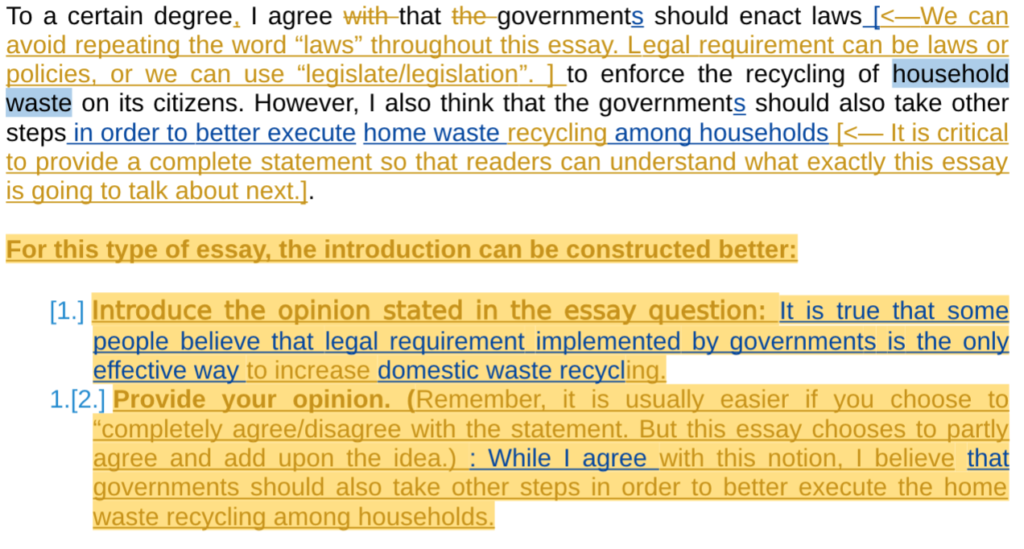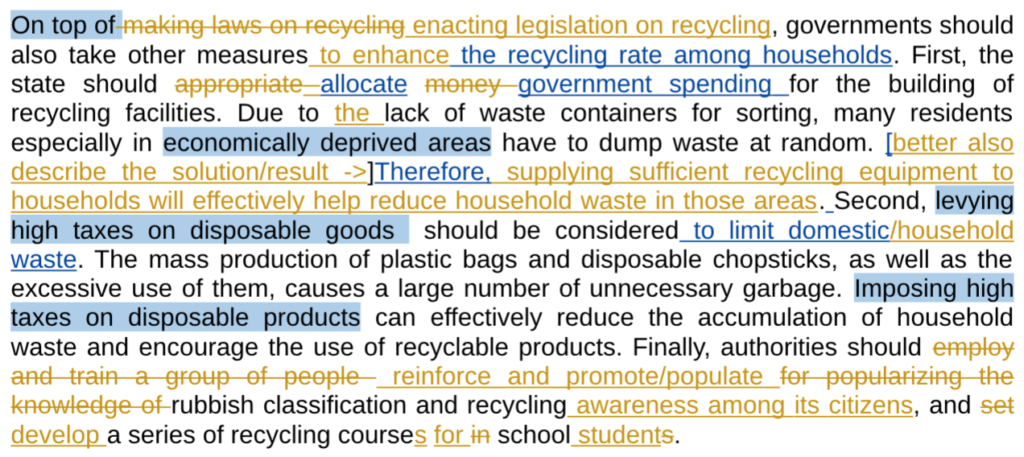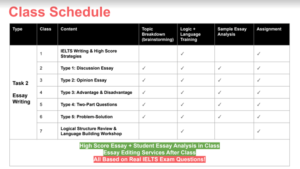


目次
IELTSライティングの採点基準のおさらい

1. Task Achievement / Task Response(適切に問題に答えているか?)
この項目では、与えられたタスクや質問に対して適切に答えているかどうかが評価されます。特に、タスク1ではデータの説明、情報の要約等が、タスク2では問題の議論、意見の提示、解決策の提案などが、どの程度適切に行われているかを見ます。
2. Coherence and Cohesion(文章は論理的で一貫性があるか?)
文章やスピーチが論理的であり、アイデアや情報が整然と結びついているかどうかを評価します。段落のつながり、論理的な流れ、適切な接続詞の使用などがこの基準で見られます。
3. Lexical Resource(幅広く正確な語彙を使っているか?)
語彙の正確性と適切性、または語彙の多様性と洗練性を評価します。トピックに関連する語彙をどの程度適切に使用できているか、または表現に富んでいるかなどが重要です。
4. Grammatical Range & Accuracy(幅広く正確な文法を使っているか?)
文法の正確性と多様性が評価されます。単文や複合文の構造、時制、ミスの少なさなど、文法的な面が重視されます。
これらの評価基準は、それぞれ0〜9.0のスコアレンジで採点され、平均したスコアがライティングセクションのスコアとなります。
そのため、どれも重要であり、バランスよくこれらの要素を含んだ文章が高い評価を受けます。

IELTSライティング タスク2のお題と原文
ライティングTask2のトピック例
Some people claim that not enough of the waste from homes is recycled. They say that the only way to increase recycling is for governments to make it a legal requirement. To what extent do you think laws are needed to make people recycle more of their waste?
このIELTSライティングタスク2のお題に対する立場は、大きく「とても賛成」、「完全に反対」、そして「バランスが取れた立場」に分けられます。以下で、それぞれの視点からざっくりどのようなエッセイにするかを一緒に考えてみましょう。
「とても賛成」の立場であれば、リサイクルの重要性を強調し、自発的な取り組みだけでは社会全体のリサイクル率を十分に向上させることができないため、政府による法的な強制措置の必要性、そして法的措置が最も効果的な手段であることを主張します。
「完全に反対」の立場であれば、法律によるリサイクルの義務化は、個人の自由への侵害と、実施・遵守の困難さやコストの負担から、現実的ではないと主張できます。この視点では、政府が個人の行動を過度にコントロールすることに反対し、自発的な環境保護活動を奨励する方法を支持します。
「バランスが取れた」立場からは、法律による義務化の必要性を述べつつ、柔軟な法律制定(例えば地域ごとの環境特性に合わせた規制等)や、法律以外の施策(例えば意識向上の啓蒙活動・教育キャンペーン、インセンティブの提供等)を組み合わせることの重要性を主張すると良いです。
これらの視点を踏まえた上で、エッセイでは自分の立場を選び、それに基づいて、論理的な議論を展開していくことが重要です。立場にかかわらず、具体的な例やデータを引用して、主張を支持することが求められます。
提出されたエッセイ


To a certain degree I agree with that the government should enact laws to enforce the recycling of household waste on its citizens. However, I also think that the government should also take other steps.
Taking recycling domestic waste as a legal responsibility is beneficial to provide a motivation for people. The growing population results in a soaring demand for consumer goods and leads to increasing number of discarded and useless materials. Because of that, the pressure on environmental protection and resource consumption have been increasing dramatically. Nevertheless, many people have not realized the consequence of their actions yet. Writing recycling into the laws as a civic duty could raise people’s recycling awareness and drive people to sort and process their living waste. Financial and administrative penalties could also act these purposes.
On top of making laws on recycling, governments should also take other measures. First, the state should appropriate money for the building of recycling facilities. Due to lack of waste containers for sorting, many residents especially in economically deprived areas have to dump waste at random. Second, levying high taxes on disposable goods should be considered. The mass production of plastic bags and disposable chopsticks, as well as the excessive use of them, causes a large number of unnecessary garbage. Imposing high taxes on disposable products can effectively reduce the accumulation of household waste and encourage the use of recyclable products. Finally, authorities should employ and train a group of people for popularizing the knowledge of rubbish classification and recycling, and set a series of recycling course in schools.
In conclusion, I believe that governments should not only legislate recycling, but also allocate fiscal resources towards enhancing infrastructures, increasing public awareness about waste sorting, and limiting disposable product usage.
添削後のエッセイと段落別解説

段落1:イントロ・導入・序論

この生徒は、政府がリサイクルを法律で義務化すべきであるという立場を取りつつ、その他の措置も必要であるというバランスの取れた意見を示しています。
簡潔で良いスタートですが、導入部としては、反対意見を述べたり、問題の背景や議論の範囲をもう少し具体的に設定できたほうがさらに高得点につながります。
例えば、なぜリサイクルが重要なのか、または政府が取るべき「他の措置」にはどのようなものがあるのかを一言提示しておきくと良いです。
語彙の指摘は、このエッセイの中に「law」という単語の使用頻度が高かったので、ここではpolicy, legislation/legislate, legal requirement等いくつかの表現の入れ替えをお勧めします。
文法的にも、「I also think the government should also take other steps」の部分で「also」が重複していますし、自身の立場をより明確に伝えるため文を補足しました。
また、より上級的な表現を使おうとすれば、「However, I believe it is also crucial for the government to pursue additional measures to better execute home waste recycling」などにすることで、繰り返しを避け、文のバリエーションを豊かにすることができます。
ボディパラグラフ1

この段落では、リサイクルの法律義務化がなぜ必要か、そしてそれがどのようにして人々の行動に影響を与えうるかを論じており、議論の主張を具体的に支持しています。
単語力において、特に「soaring demand」「discarded and useless materials」「civic duty」などの表現は、議論を豊かにしています。
しかし、「motivation for people」は自然ではないので、「motivate people to … 」などのように言い換えることで、語彙の精度をさらに高めることができます。
文末の「Financial and administrative penalties could also act these purposes」は文法ミスで、「act for/ serve these purposes」または、「could be further implemented for such purposes」のように、より適切な表現に修正することが推奨されます。
また、環境問題への直接的な解決策として法律の役割を強調する際には、具体的な例やデータを引用することで、主張の信憑性を高めることができます。
ボディパラグラフ2

この段落では、リサイクル法制定以外に政府が取るべき措置について論じています。ここでは、具体的な提案がいくつか示されており、議論の幅を広げています。
「economically deprived areas」「levy high taxes」「disposable goods」「impose taxes」などの表現は、語彙の幅を示すことができています。
一方、「making laws」を「enacting legislation」に、「the state should appropriate money」を「the state should allocate government spending / funds」、「employ and train people for popularizing the knowledge of …」を「reinforce and promote/populate」に言い換えることで、より正確かつプロフェッショナルな表現ができます。
また、経済的に恵まれていない地域の具体例を書く際、その結果を追記し、それぞれの提案を述べる時も目的を明確に書き足すことで、著者の見解をより明確に伝えることができます。
結論

結論は、エッセイの主要なポイントを簡潔に要約しており、読者が著者の主張の全体像を理解するのに役立ちます。
この段落では、著者はエッセイ全体の主張、つまり「政府がリサイクルを法律で義務化するだけでなく、他の重要な措置も講じるべきである」という立場を明確にし議論を締めくくっています。
各提案が簡潔にまとめられており、エッセイの流れと一貫性を保ちながら、論点を明確に伝えています。
「allocate fiscal resources」「enhancing infrastructures」「increasing public awareness」「limiting disposable product usage」という表現は、議論の要点を明確に伝えています。
総評と評価項目別の採点
採点と総評


Task Achievement(課題達成度)- 7.0:
全体的に、政府がリサイクル法を施行すべきだが他にも手段を講じるべきだという立場が明確で、説得力のあるかつ関連性のある論点でサポートしています。お題に適切に対応していると言えるでしょう。
Coherence and Cohesion(まとまりと一貫性)- 6.0:
エッセイは導入、ボディパラグラフ、結論といった論理的な構成になっています。流れは概して良好ですが、可読性を向上させるためにいくつかの文がより明確になると良いでしょう。特に、導入部やトピックセンテンスにおいていくつかの文を改善する余地があります。
Lexical Resource(語彙力)- 6.5:
トピックに適切で、全体的に正確な語彙を使用していますし、いくつかの上級な単語やフレーズも使われています(他にも上記で青色で強調されているものも同様です)。ただし、表現には正確性が欠けたところも散見され、、また“laws” という単語が繰り返し使われているため、代替表現を見つける余地があります。
Grammatical Range and Accuracy(文法の範囲と正確性)- 6.5:
文法はほとんど正確ですが、いくつかの問題があります。単数複数等いくつかの文法的ミスが見られます。また、一部の文の構造や内容に改善の余地があります。

添削後の模範解答
Some people hold the conviction that legal requirement implemented by governments is the only effective way to increase domestic waste recycling. While I share this sentiment to a degree, I believe that governments should also take other steps to better execute home waste recycling among households.
Taking recycling domestic waste as a legal responsibility is beneficial in motivating people to voluntarily recycle the waste at home. The growing population results in soaring demand for consumer goods and an increasing number of discarded and useless materials. Because of that, the pressure on environmental protection and resource consumption has been increasing dramatically. Nevertheless, many people have not realized the consequences of their actions yet. Writing recycling into the laws or policies as a civic duty could raise people’s recycling awareness and drive people to sort and process their living waste. Meanwhile, financial and administrative penalties could further be implemented for such purposes.
On top of enacting legislation on recycling, governments should also take other measures to enhance the recycling rate among households. First, the state should allocate government spending for the building of recycling facilities. Due to the lack of waste containers for sorting, many residents especially in economically deprived areas have to dump waste at random. Therefore, supplying sufficient recycling equipment to households will effectively help reduce household waste in those areas. Second, levying high taxes on disposable goods should be considered to limit domestic/household waste. The mass production of plastic bags and disposable chopsticks, as well as the excessive use of them, causes a large number of unnecessary garbage. Imposing high taxes on disposable products can effectively reduce the accumulation of household waste and encourage the use of recyclable products. Finally, authorities should reinforce and promote/populate rubbish classification and recycling awareness among its citizens, and develop a series of recycling courses for school students.
In conclusion, I believe that governments should not only legislate recycling, but also allocate fiscal resources towards enhancing infrastructures, increasing public awareness about waste sorting, and limiting disposable product usage.
IELTS受験生への4つのアドバイス


















